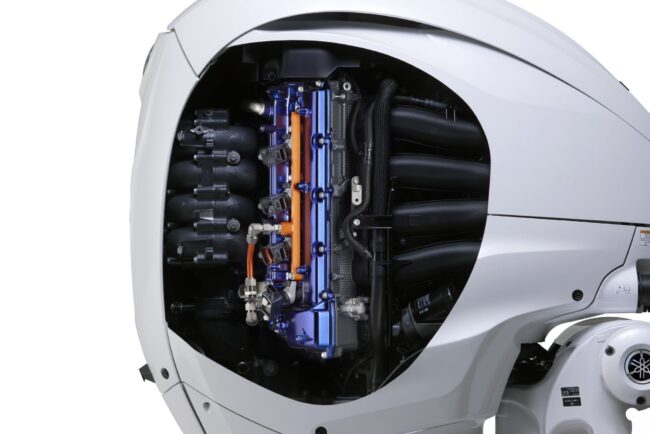
True to The Watercraft Journal’s reporting back in June of last year, Yamaha Motor Corp. USA pushes forward on its goal of carbon neutrality by 2030. As outlined in the company’s 2050 Environmental Plan, Yamaha marches forward toward radically re-imagining its marine offerings – this time by joining the Fuel Cell & Hydrogen Energy Association (FCHEA) as well as announcing the development of a hydrogen outboard motor.
Now before you think, “Hydrogen? You gotta be kidding me!” understand that many of the world’s biggest automakers – General Motors, Toyota, Ford, Honda, Mercedes-Benz and several others – have all invested tens of millions into countering the highly politicized EV market by developing hydrogen-powered engines. Yamaha’s involvement in such an effort is squarely on par with manufacturers looking for clean alternatives to electric-only vehicles.
It was revealed earlier that Yamaha’s efforts to reduce its environmental impact would include removing a quart of oil used in all 1.9-liter High Output Marine engines, ironically exasperating the very issue plaguing the current HO and SVHO engines – oil starvation due to an inferior oil pickup and oil pan cage/trap design (as revealed during an episode of The Watercraft Journal IRL podcast in late 2023). The prototype hydrogen-powered outboard is set to debut at the Miami International Boat Show this coming February 14-18, 2024.
Read the whole press release below:
Yamaha Motor Corporation, U.S.A. joined the Fuel Cell & Hydrogen Energy Association (FCHEA) alongside hydrogen producers, infrastructure providers, engineering firms, and other off-takers as part of its pursuit of multiple technology solutions to achieve carbon neutrality.
The company recently announced the development of a prototype hydrogen outboard motor that will be on display at the 2024 Miami International Boat Show.
“Yamaha plans to work diligently with FCHEA to advance hydrogen energy and fuel cell policies,” said Martin Peters, Director of Yamaha Marine External Affairs, who will serve on the organization’s board of directors. “There is much to be done to prepare the future of decarbonizing the recreational boating and outdoor space, technically and in legislation and policy. We look forward to working as a team with FCHEA and its member companies. We hope others in our industry will join us.”
“We are very excited to welcome Yamaha to the association,” said Frank Wolak, FCHEA President and CEO. “Having an innovative company with a strong foundation in multiple mobility sectors focus on hydrogen is a tremendous asset for FCHEA and the hydrogen industry at large.”
A recent, first-of-its-kind study commissioned by the International Council of Marine Industry Associations (ICOMIA) entitled The Pathways to Decarbonisation for the Recreational Marine Industry, validates Yamaha’s approach to carbon neutrality, revealing a multi-plan approach is the best way to continue the decarbonization of recreational boating.
Through the study, a leading global engineering consulting firm, Ricardo plc, investigated propulsion technologies across nine common recreational watercraft to compare the impact of lifetime global greenhouse gas (GHG) emissions, financial costs, usability, performance, range, and infrastructure implications.
Due to the unique water environment of boats, the study found there is no “one-size-fits-all” solution, and instead recommends a portfolio of technologies to continue the reduction of carbon emissions within the recreational boating industry including a combination of electric, hybrid, sustainable fuel and internal combustion applications.
In the last two decades, the U.S. recreational marine industry alone has decreased marine engine emissions by more than 90 percent and increased fuel efficiency by more than 40 percent.






